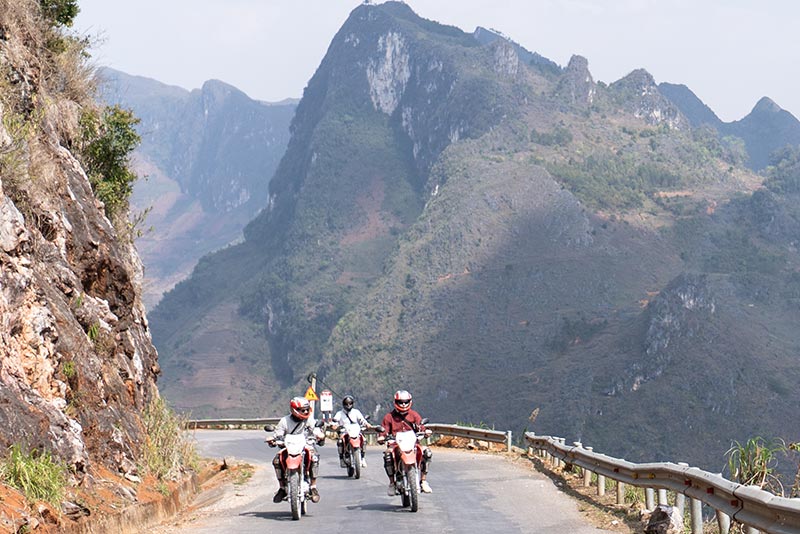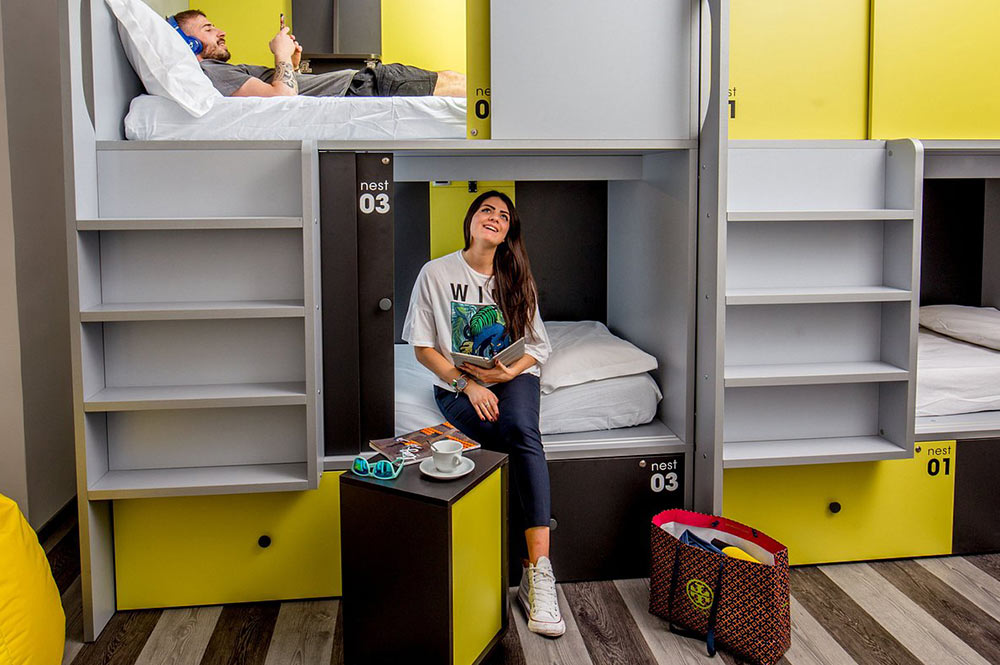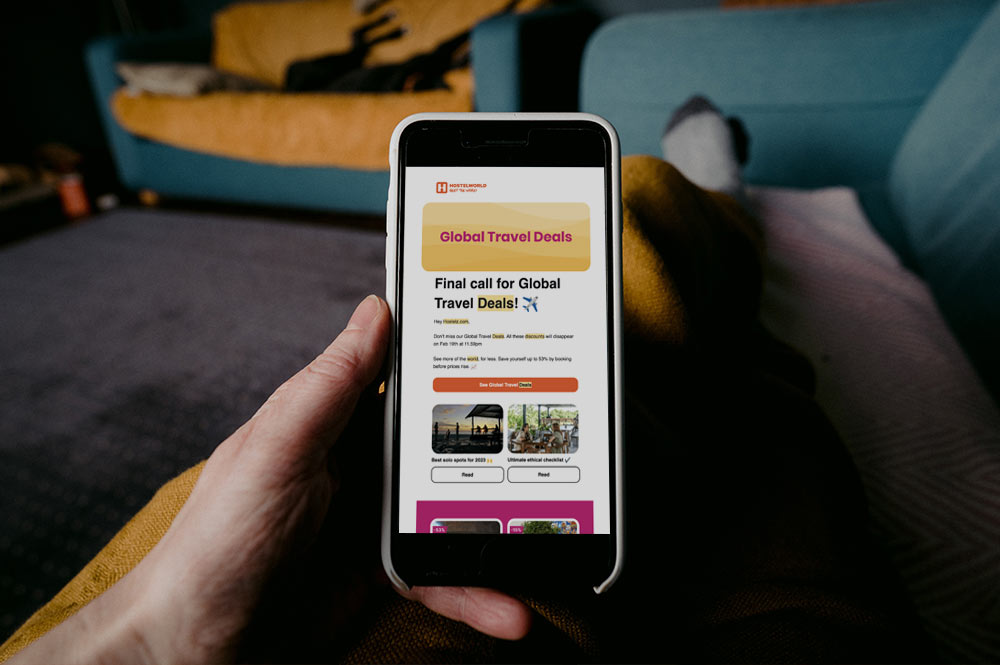Traveling isn’t just about where you go — it’s how you go.
The difference between a chaotic trip and a smooth adventure often lies in the details: knowing the exact moment to reject an ATM’s conversion offer, why a $5 extension cord is a lifesaver, or how being “stupid and cheerful” can get you out of a jam with border guards.
Our best travel tips are hard-earned, street-smart strategies that can save you money, time, and stress. We cover anything from eSim Data to a smarter packing list e.g. the extension cort...
For our beginner travelers, make sure you read our guide to first-time in a hostel.
Let’s get into it.
The Psychology of Smooth Travel

Walk with Confidence, Even When You’re Lost
- Even if you have no clue where you are, act like you do. Confidence makes you less of a target for scams or pickpockets. Look purposeful, check your map discreetly, and avoid wandering aimlessly.
Be 'Stupid and Cheerful' with Authorities
- If you face issues with police, border guards, or airline staff, adopt a “stupid and cheerful” attitude. Smile, stay polite, and claim ignorance if needed. This approach often defuses tension better than aggression and transcends cultural barriers.
Be Flexible with Your Itinerary
- Itineraries are great, but travel is about discovery. If you love a place, stay longer. If it’s not clicking, move on. Don’t force it just because you spent money to get there.
Be Cheap Even If You Don’t Have To Be
- Adopting a budget traveler mindset, even if you can afford luxury, forces you to experience destinations more authentically. Constraints lead to creative solutions:
- Staying in hostels instead of hotels = meeting travelers.
- Taking public transport = seeing local life up close.
- Eating street food = discovering flavors you’d miss in a fancy restaurant.
- These experiences often lead to the most unexpected and unforgettable moments. Money can buy comfort, but the best travel stories are earned through ingenuity and openness.
Stay Longer Than 3 Days in Each Place
- Constantly moving cities is exhausting and wastes time in transit. Staying at least 3 days lets you explore more deeply, rest properly, and avoid seeing more bus stations than sights.
Call the Airline When Flights Are Canceled
- Don’t waste time standing in endless lines when your flight is canceled. Call the airline directly. Agents on the phone can often rebook you faster than the overwhelmed staff at the counter.
Plan Without Pain: Itinerary Tricks for Effortless Travel

Build a Custom Google Map Before Your Trip
- Create a personalized Google Map for the city you’re visiting. Drop pins for restaurants, attractions, hostels, and anything else you want to see. This way, you can plan efficient routes and avoid zigzagging across town. No more realizing your dinner spot was right next to the museum you visited this morning. Your feet (and sanity) will thank you.
Save a Pin for Your Accommodation
- Always drop a pin for your accommodation on your map. If you’re frequently on the move, this helps you navigate back easily, even if you forget the name or address. I usually add it to my Favorites so the pin stands out with a different icon. Google Maps also allows you to use a personalized icon for even easier identification.
Use Smart Map Apps Strategically
- OsmAnd (based on OpenStreetMap) is fantastic for walking, hiking, and cycling, offering detailed offline maps. Download maps for your destination before your trip to navigate without using data. Perfect for off-the-grid adventures.
- Google Maps excels for driving, thanks to real-time traffic updates. You can also download specific areas for offline use, ensuring you’re covered even when Wi-Fi is scarce.
- BRouter is ideal for planning detailed hiking and cycling routes. Using OpenStreetMap data, it lets you customize routes based on your activity profile and works seamlessly with offline maps.
Having these apps ready means you’re never lost, even when your connection is. - Download an Offline Map. It helps you when there is no internet connection. It's such a small thing to do that goes a long way once you need it. In our guide about Best Travel Websites we share our favorites ones.
Street-Smart Strategies for Safer Travels
Share Your Itinerary with Family
- Send your travel itinerary to a trusted friend or family member. Update them if plans change. It’s a simple safety measure that ensures someone always knows where you are.
Check Local News Sites for Protests and Strikes
- Stay informed by checking local news websites for potential protests, strikes, or disruptions. Knowing about these events ahead of time can help you avoid delays, unsafe areas, and logistical nightmares. Websites like Google News can provide timely updates.
Use a VPN for Secure Wi-Fi Connections
- Public Wi-Fi networks are playgrounds for hackers. Protect your data with a VPN (Virtual Private Network) on your phone and laptop. A VPN encrypts your connection, keeping sensitive information like passwords and credit card details safe.
Bonus: You can access region-restricted content abroad, like Netflix libraries.
Create a WhatsApp Group for Trip Essentials
- Make a WhatsApp group (or any other messaging app you use) with yourself and send important documents (passport photos, bookings, addresses, reminders) there. This keeps everything organized in one place and accessible even offline.
Change Your Phone Lock Screen to an Emergency Contact
- Set your lock screen image to display an emergency contact number. If someone finds your lost phone, there's a 50% chance they’ll return it – make it easy for them to do the right thing.
Download Languages on Google Translate for Offline Use
- Wi-Fi isn’t always reliable when you’re lost in a new country. Download the local language on Google Translate for offline access.
Carry a Portable Power Bank
- With the average smartphone lasting only 7-10 hours with active use, a portable power bank is essential. A 10,000 mAh power bank can charge your phone up to 3 times. Perfect for long days of exploring when outlets are nowhere in sight.
Stay Connected with SIM Cards and eSIMs
- Ditch expensive roaming fees by using local SIM cards or eSIMs for affordable data abroad.
- Local SIM Cards: These are available at airports, convenience stores, and kiosks. In countries like Thailand, Vietnam, and much of Europe, you can get unlimited data for as little as $10-15. Just ensure your phone is unlocked before you travel.
- eSIMs: No need to swap physical cards. With apps like Saily and Airalo
you can download an eSIM for your destination before you even land. Prices vary,
but you can find plans for around $5 per GB or unlimited options for a set
period. eSIMs work in over 190 countries and are perfect for multi-destination
trips. - Dual SIM Phones: If your phone supports dual SIM, you can keep your home number active for calls and texts while using a local SIM or eSIM for data.
Check out Saily eSim Cards here
Pack, Plan, and Conquer

Create and Use Packing Lists
We have here a complete packing list. It includes many items you may not have considered.
- A well-thought-out packing list helps you avoid overpacking and ensures you don’t forget essentials. Research shows that 65% of travelers forget at least one item on their trips. Lists reduce stress and streamline your packing process, letting you focus on the adventure ahead.
Free Up Phone Storage Before Your Trip
- The average traveler takes about 200 photos per week on a trip. And running out of storage mid-trip is a nightmare. Clear your phone storage before leaving or invest in cloud storage. More space = more memories captured.
Packing Cubes with Compression Straps Are Game-Changers
- Packing cubes aren’t just for neat freaks – they help you fit more into your bag and stay organized. Opt for cubes with compression straps (or a synch feature) to squeeze down your clothes.
Pack Carabiners for Extra Carry Options
- Carabiners are simple but versatile tools. Clip your water bottle, flip-flops, or even a jacket to the outside of your backpack. They’re great for freeing up internal space and making sure your essentials are within easy reach.
Don’t Forget Flip-Flops
- Public showers, beach days, hostel showers – flip-flops are indispensable.
Pack a Plastic Bag for Dirty Clothes
- A simple plastic bag keeps dirty clothes separate from clean ones. When you get home, just dump the bag into the washer. Easy, organized, and odor-free.
You Can Wash Clothes Anywhere
- Laundry services are cheap and quick in most places. A 2-hour wash is all it takes, so pack less and wash more.
Go Full Merino for Clothing
- Merino wool clothes are magic. They’re breathable, regulate temperature, and don’t smell even after days of wear. Perfect for minimalist packing.
Pack Spare Socks and Undies in Your Carry-On
- Lost luggage happens. Keep a spare pair of socks and underwear in your carry-on so you're not caught out if your checked bag goes AWOL. It’s a small comfort that makes a big difference.
Standardize Your Charging Setup with USB-C
- Make all your devices chargeable by USB-C. Invest in a 100W power supply and a 3m USB-C cable. It reduces clutter, simplifies packing, and eliminates the need for multiple chargers.
Pack a 3-Port Extension Cord
- Grab a 6ft, 3-port extension cord from any hardware store. This lightweight tool turns one outlet into three and extends reach to more convenient spots. Perfect for airports where outlets are scarce or awkwardly placed. In hostels, it makes charging on the top bunk easier, and in hotels, it brings outlets out from behind beds or dressers. Just remember to pair it with a plug adapter for different countries.
Money Moves That Keep You Traveling

Use a Debit Card for Fee-Free Currency Withdrawals
ATM fees abroad can drain your budget faster than you think. A Charles Schwab debit card is a top choice for fee-free ATM withdrawals worldwide, offering 0% foreign transaction fees and unlimited ATM fee reimbursements. But if you’re looking for more budget-friendly or flexible alternatives, consider options like Revolut or Wise (formerly TransferWise).
- Revolut offers fee-free withdrawals up to a certain monthly limit (e.g., $200 or €200) with minimal exchange rate markups.
- Wise provides fee-free currency conversion at mid-market rates and allows cash withdrawals up to a set limit before small fees apply.
These cards are great if you don’t need unlimited withdrawals but want to avoid traditional banks’ hefty foreign transaction fees. They also support multiple currencies, making them perfect for multi-country trips. Just make sure to check your limits and fees to pick the one that best suits your travel style.
Stay in Hostels for Affordable Private Rooms – and Use Hostelz to Find the Best Deals
- If you think hostels are just for dorm-room chaos, think again. Many modern hostels offer private rooms that are often cheaper than hotel rooms but still come with all the social perks of hostel life. You get the privacy you want and a chance to meet like-minded travelers in shared spaces like kitchens or lounges.
- To make sure you’re getting the best rate, use Hostelz.com. Hostelz compares prices for hostels listed on Booking.com and Hostelworld, showing you which platform offers the cheapest rate for the same room and dates. Believe it or not, even when these platforms list the same hostels, the prices can differ. With Hostelz, you can save up to 23% by booking smarter. Whether you’re after a bunk bed or a private room, Hostelz ensures you’re getting the best deal out there.
Here you find a big comparison of Hostelworld vs Booking vs Hostelz.
Get a Premium Travel Credit Card for Free Lounge Access
- Airports don’t have to be a grim experience of overpriced sandwiches and stiff chairs. Premium travel credit cards grant you free access to top-tier airport lounges, where you can enjoy complimentary meals, drinks, Wi-Fi, and a comfortable place to unwind. Popular options include the Chase Sapphire Reserve, Capital One Venture X (CVx), and Amex Platinum.
- If those sound too pricey for your budget, don't worry – there are alternatives! Cards like Revolut Premium and Revolut Metal offer lounge access at a much lower annual fee. Plus, if you travel frequently, Revolut cards come with other perks like fee-free currency exchange, travel insurance, and global ATM fee reductions.
Notify Your Bank About International Travel
- Every year, over 7 million travelers experience their cards getting blocked abroad due to fraud protection. Avoid this by notifying your bank before traveling or enabling international purchase features in your banking app. This simple step ensures uninterrupted access to your money while you’re overseas.
Know the Market Exchange Rate Before You Leave
- Check the current exchange rate on sites like XE.com before your trip. Some airports offer surprisingly decent rates, while others inflate rates by 10-15%. Knowing the market rate helps you make an informed choice. If the airport rate isn’t a total rip-off, you might grab some cash for immediate needs – otherwise, wait for a better option in the city.
Always Pay in the Local Currency
- When using a credit card abroad, you’ll often get a choice: pay in the local currency or your home currency. Always choose the local currency. Why? Dynamic Currency Conversion (DCC) inflates rates by an extra 3-7%, adding unnecessary costs. Your bank’s conversion rate will almost always be better.
Exchange Money Abroad, Not at Home
- Unless you’re dealing with a rare currency, you’ll get a better rate by exchanging your money abroad rather than at home. Banks in your home country may charge fees or offer poor rates due to limited demand. ATMs abroad typically give you the mid-market rate with fewer fees, especially if you use fee-free cards like Revolut or Wise.
Turbulence-Free Travel Advice

Stay Hydrated When Flying
- Airplane cabin humidity is only around 10-20% (drier than most deserts). This can lead to dehydration, fatigue, and dry skin. Drink 8 oz (240 ml) of water for every hour you’re in the air. Your body and skin will thank you.
Use SeatGuru to Find the Best Plane Seats
- Check SeatGuru.com before selecting your flight seat. Detailed seat maps help you avoid cramped rows, broken recliners, and noisy spots near restrooms. Considering that 58% of travelers say seat comfort impacts their flight satisfaction, a quick SeatGuru check can make a long flight far more bearable.
Use Skiplagged for Cheap Flights
- Skiplagged reveals hidden city fares, where a layover city is your actual destination. This hack can save up to 40% compared to direct flights. Airlines don’t love it, but it’s completely legal. Just remember to pack light and avoid checking bags, as they’ll end up at the final destination.
Consider Alternative Airports
- Flying into smaller regional airports can be up to 30% cheaper than major hubs. For example, flying into London Gatwick instead of Heathrow or Burbank instead of LAX can save you money and reduce hassle due to smaller crowds and fewer delays.
Healthy Traveler, Happy Traveler

Bring Medication for Digestive Emergencies
- Traveler’s diarrhea affects up to 50% of international travelers, especially in regions like Southeast Asia and Latin America. Make sure to pack appropriate medication with you that can provide quick relief, letting you enjoy your trip without digestion disruptions.
Never Walk Past a Clean Toilet
- When you find a clean public restroom, use it. Studies show that 1 in 3 travelers have experienced difficulty finding a usable toilet while abroad. Don’t gamble on finding another one soon.
Don’t Skip Travel Insurance – It’s Cheaper Than You Think
- Travel insurance (here's a great one) isn’t just for worrywarts; it’s for anyone who doesn’t want a small mishap to ruin their trip (and bank account). A good policy can cover: Medical emergencies, trip cancellations, lost baggage and emergency evacuations.
- For around $2-$5 per day, you can avoid potential bills that could run into the thousands. Companies like HeyMondo offer flexible plans for backpackers and long-term travelers.
- Remember: A broken arm in the U.S. could cost $2,500 without insurance. An emergency evacuation from a remote area might cost $100,000.
- Pay a little now to avoid paying a fortune later.
Here are more details and a full review of Heymondo travel insurance. and another review of the cheapest travel insurance for long-term backpackers, Safetywing.

Hostelz.com is the world’s most comprehensive hostel-focused travel platform. We bring together listings from all the major booking sites to help you easily compare prices, see real guest reviews, and find the best deals—no matter where you’re headed. Check out our How It Works page.
Not sure which hostel to pick? Use our Hostel Comparizon Tool to compare your favorite hostels side-by-side before you book.
Let us help you travel smarter and sleep cheaper.
Travel Cheaper, Travel Longer



